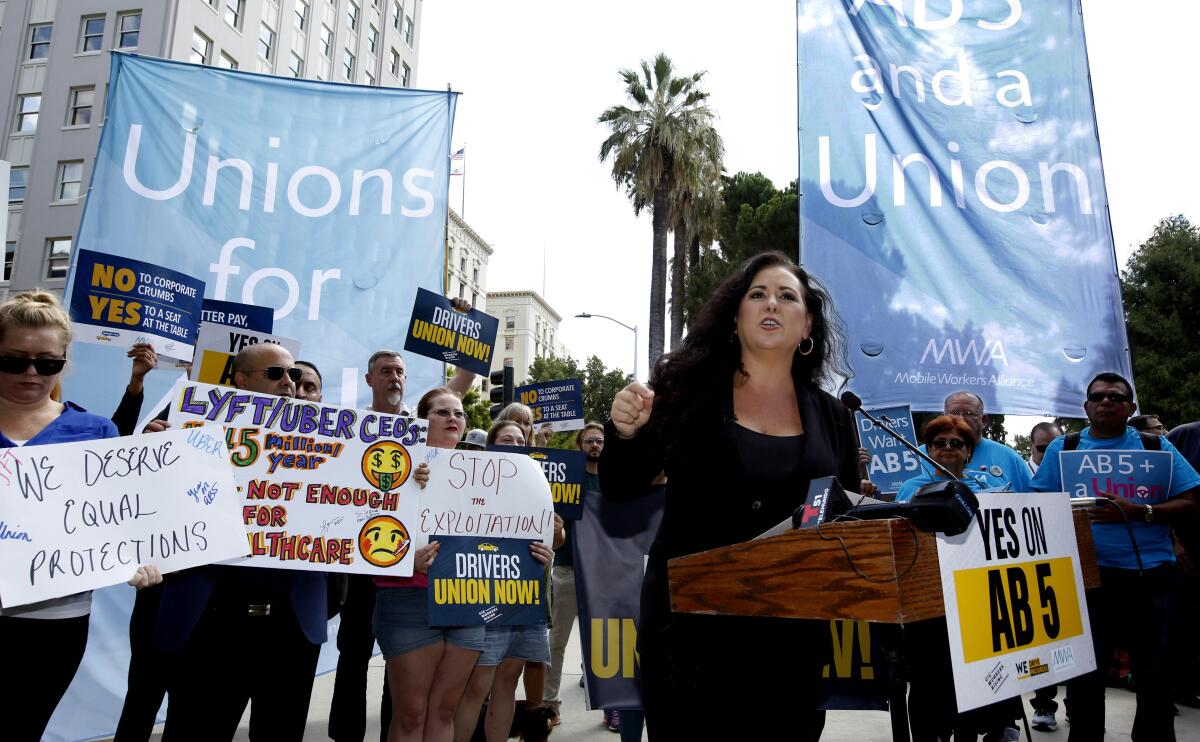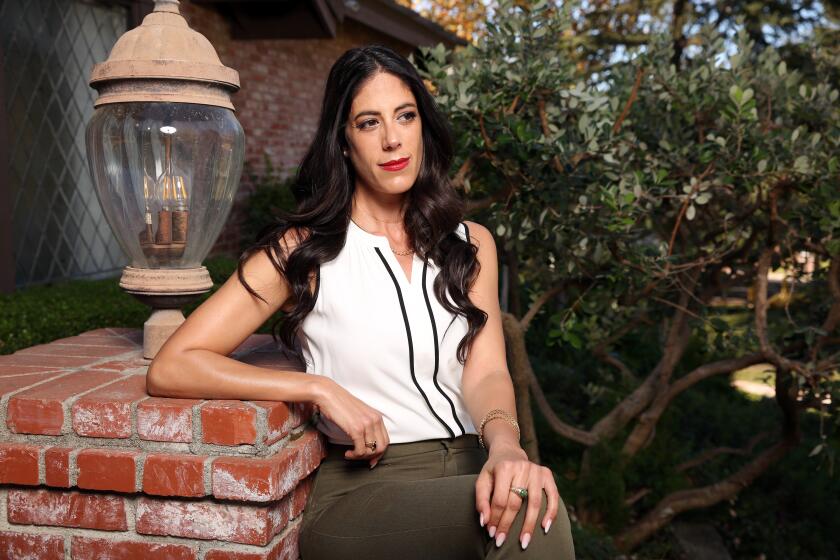Proposed California law would give actors and music artists more labor protections

- Share via
Back in 2010, veteran actor Michelle Hurd was starring on A&E’s “The Glades,” a crime drama set in the tangled swamps of South Florida.
Cable channels were embracing splashy original shows — but ordering fewer episodes per season than had been the norm. TV networks had long relied on shows that ran 22 or more episodes each season, which kept actors and crews busy nine months out of a year. But the rise of cable originals, and now streaming, has accelerated the trend toward shows with shorter runs — and increasingly long gaps between seasons.
For actors like Hurd, who get paid by the episode, this means stretching smaller amounts of pay over longer periods of time. “I had to hustle to pay for my mortgage, for my food, for my everything ... because I only had five months at a time where I was working,” Hurd, a national board member of SAG-AFTRA, said in an interview.
While working on “The Glades,” which had four 13-episode seasons, Hurd said she was forced to find jobs on other shows during the downtime. However, many series contracts preclude actors from taking on outside roles with exclusivity clauses (meaning the artist can work only for the identified employer — a producer, studio or label — during the term of the contract). Hurd said she would take on as many outside gigs as she could to make ends meet and then beg forgiveness after the fact. She is now a regular on the CBS-produced “Star Trek: Picard,” whose second 10-episode season is in production and will stream on Paramount+.
Recently introduced legislation in Sacramento could change decades of industry practice and create more flexibility for actors like Hurd.
Earlier this month, Assemblywoman Lorena Gonzalez (D-San Diego), the lawmaker behind the contentious AB5, introduced the FAIR Act, which stands for “Free Artists from Industry Restrictions.” SAG-AFTRA has thrown its weight behind the proposed law, which would limit the ability of production studios and record labels to hold artists off the job market, unpaid, for extended periods of time.
The legislation is the latest effort by Hollywood unions to help entertainment industry workers — including actors, directors and crew members — get a better deal, particularly now that streaming companies have become such a large part of the economy.
Industrywide, the average number of episodes in a TV series’ season fell nearly 40% between 2009 and 2020, and the amount of time between seasons increased from 160 days to more than 210 days from 2006 to 2019, according to SAG-AFTRA.
This can be a problem for actors because their contracts often include exclusivity arrangements, which prevent them from appearing in other productions while a series stretches on — sometimes for years. The practice harks to an era when powerful studios wanted to make sure their actors were continually available to maintain tight production schedules. In addition, TV network chiefs didn’t want to see their top talent appearing on a competing network.
“I knew that I signed on as an actor for a career that was feast or famine,” Jason George, another SAG-AFTRA board member who stars on ABC firefighter drama “Station 19,” said in an interview. “But I found myself in situations ... where I couldn’t go out and look for work.”
George, a classically trained theater actor whose credits include “Grey’s Anatomy,” and “Eli Stone,” said the studios’ demands for exclusivity might have worked for actors three decades ago when there “were only three networks that kept you busy for nine months of the year.”
While the COVID-19 pandemic has shrunk crew sizes and banned crowd scenes, Hollywood’s new safety rules mean longer jobs for some background actors.
But he said the exclusivity clauses, and the shorter seasons, have created financial stress for him — and countless others. George recalled a time when he went without pay for 15 months between shoots and weighed selling his house.
If enacted, the proposed legislation could take effect next year and, in its current form, would apply to existing contracts. It could affect many of the more than 82,000 members of SAG-AFTRA and the Music Artists Coalition, who include actors, recording artists and singers who reside and work in California.
The FAIR Act would make major changes to California labor laws.
It would abolish an exemption to the state’s 150-year-old Seven-Year Statute. This rule prevents Californians from being tied into long-term employment contracts by limiting such arrangements to seven years. But in 1987, the music industry successfully lobbied for an exemption to the rule to exclude recording artists. As a result, recording artists could face damages if they tried to break free of their label. The FAIR Act, backed by music industry groups such as Irving Azoff’s Music Artists Coalition, the Black Music Action Coalition and Songwriters of North America, would extend the protection of the Seven-Year Statute to recording artists.
The statute was thrust into the spotlight in 1944 when actress Olivia de Havilland used it to extricate herself from her Warner Bros. contract. More recently, the Seven-Year Statute has been cited in lawsuits by Viacom and Fox against Netflix over alleged poaching of the traditional media companies’ executives.
The second change under the proposed legislation would require studios to exercise options to use an actor and produce a subsequent season within 12 months after that actor finished shooting scenes for the prior season. That would shorten the length of time actors are held off the market without pay.
“This would be a game-changer for balancing out unfair restrictions that keep actors from working or earning a living for long periods of time,” said Duncan Crabtree-Ireland, SAG-AFTRA’s chief operating officer and general counsel. The union has tried to fight these contractual restrictions but has met stiff resistance. “It could really change the whole mindset of the industry,” he said.
It is not clear how many lawmakers will support the bill. The Motion Picture Assn., which represents the major studios, including Netflix, said it was not supporting the measure.
“We are aware of the bill, and believe this is an issue better resolved in collective bargaining where it originated and has been dealt with in past negotiations,” the MPA said in a statement.
But Gonzalez, the lawmaker, said she feels the changes are needed.
“A lot of people don’t understand the issues that exist for artists in this industry,” Gonzalez said in an interview. She said she had been approached by SAG-AFTRA to address the issues of actors, adding that the proposed legislation furthers her work trying to champion the rights of everyday workers. She said studios have inquired about the proposed legislation.
“I think most of the public thinks that Hollywood is the big stars,” Gonzalez said. “But we’re focusing on the working artists who may have a recurring role on a TV series, those artists who don’t make millions of dollars per season. [They are the ones] we’re trying to protect here ... as the industry has changed.”
Inside the business of entertainment
The Wide Shot brings you news, analysis and insights on everything from streaming wars to production — and what it all means for the future.
You may occasionally receive promotional content from the Los Angeles Times.
More to Read
Inside the business of entertainment
The Wide Shot brings you news, analysis and insights on everything from streaming wars to production — and what it all means for the future.
You may occasionally receive promotional content from the Los Angeles Times.












